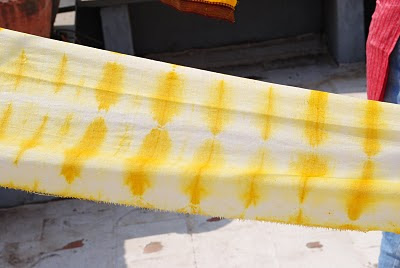




Happy pongal from Chidambaram. Pongal is a harvest festival celebrating the abundance of crops and giving thanks to the sun god and cows for food and milk. Preparations for Pongal have been in full swing. Yesterday we headed to the market to get beautiful fresh purple sugar cane stalks to decorate our home with and eat after the festivities, fresh ginger and turmeric with their stems and leaves to use to prepare the pongal with. Pongal literally means to boil over, and in the morning on Pongal day, a dish called "chakara pongal" - a sweetened rice pudding is prepared, as the milk boils over the pot adorned with the turmeric and ginger leaves, we chant " pongal - o - pongal" boil boil!
special kolams are made to decorate the outside of the house.
a simple recipe for my version of chakara pongal:
Ingredients:
handful of cashews
1 tsp. freshly ground cardamom powder
1 tbsp. jaggery
1/2 cup rice
2 cups milk
ghee
1. heat the ghee in a pot and add the cashews, once browned add the rice and saute a bit until ric is clear
2. add the jaggery, milk and cardamom
3. stir constantly to avoid the bottom from burning
4. chant pongal - o-pongal!
5. enjoy


 pomegranate is certainly one of my favorites fruits. its deep red color and juicy gems within are so refreshing and healthy. this ancient plant is native to iran and northern india and is widely cultivated in the mediterranean, india and tropical africa. if you've ever wondered how many seeds a pomegranate has within - guess no more, the average among varieties is 613!
pomegranate is certainly one of my favorites fruits. its deep red color and juicy gems within are so refreshing and healthy. this ancient plant is native to iran and northern india and is widely cultivated in the mediterranean, india and tropical africa. if you've ever wondered how many seeds a pomegranate has within - guess no more, the average among varieties is 613! 

































